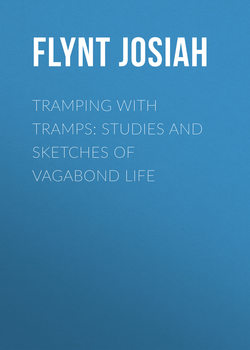Читать книгу Tramping with Tramps: Studies and Sketches of Vagabond Life - Flynt Josiah - Страница 19
PART I
STUDIES
III
CLUB LIFE AMONG OUTCASTS
VII
ОглавлениеOf the Old Bucks, – the superannuated outcasts, – and their club life, there is very little to say. Walk into any low dive in any city where they congregate, and you can see the whole affair. They sit there on the benches in tattered clothes, and rest their chins on crooked sticks or in their hands, and glare at one another with bloodshot eyes. Between drinks they discuss old times, old pals, old winnings, and then wonder what the new times amount to. And now and then, when in the mood, they throw a little crude thought on politics into the air. I have heard them discuss home rule, free trade, the Eastern question, and at the same time crack a joke on a hungry mosquito. A bit of wit, nasty or otherwise, will double them up in an instant, and then they cough and scramble to get their equilibrium again.
Late at night, when they can sit no longer on the whittled benches, and the bartender orders them home, they crawl away to musty lodging-houses and lie down in miserable bunks. The next morning they are on hand again at the same saloon, with the same old jokes and the same old laughs. They keep track of their younger pals if they can, and do their best to hold together their close relationships, and as one of their number tumbles down and dies, they remember his good points, and call for another beer. The Natives help them along now and then, and even the boys give them a dime on special occasions. But as they never need very much, and as low life is often the only one they know, they find it not very difficult to pick their way on to the end. If you pity them they are likely to laugh at you, and I have even known them to ask a city missionary if he would not take a drink with them.
To think of enticing such men into decent clubs is absurd; the only respectable place they ever enter is a reading-room – and then not to read. No, indeed! Watch them in Cooper Union. Half the time their newspapers are upside down and they are dozing. One eye is always on the alert, and the minute they think you are watching they grip the newspaper afresh, fairly pawing the print with their greasy fingers in their eagerness to carry out the rôle they have assumed. One day, in such a place, I scraped acquaintance with one of them, and, as if to show that it was the literary attraction which brought him there, he suddenly asked me in a most confidential tone what I thought of Tennyson. Of course I thought a good deal of him, and said so, but I had hardly finished before the old fellow querulously remarked:
"Don' cher think the best thing he ever did was that air 'Charge of the Seventeen Hundred'?"
